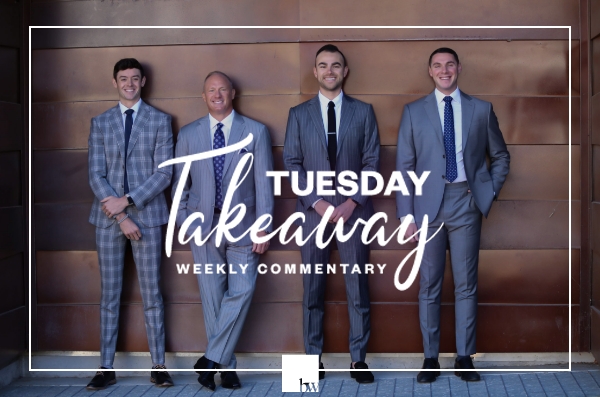
Market Insights:
January 2, 2024
Posted on January 02, 2024
Planning and Guidance, Tailored To Your Life and Goals
Tuesday Takeaway
Posted on March 28, 2017

Nasdaq.comreported controversy over the bill was “raising questions about [Republicans’] ability to focus on and pass policies that the market has been eagerly anticipating, such as tax reform and infrastructure spending.” Financial Times concurred:
“The post-election stock market rally has been largely powered by hopes Donald Trump’s administration would swiftly launch a bevy of aggressive economic stimulus measures, including tax cuts, deregulation, and infrastructure spending. However, Mr. Trump’s difficulty in Congress over the government’s healthcare plan has prompted some reappraisal by investors of the prospect of significant stimulus arriving later this year.”
Financial Times pointed out it’s likely other factors played a role in investors’ decision-making, as well. Some professionals have become concerned about market valuations. About 34 percent of fund managers believe global equity markets are overvalued and 81 percent say U.S. equities are the most expensive in the world, reported Fortune Magazine citing Bank of America Merrill Lynch’s survey of fund managers. In addition, estimates for corporate earnings have been revised lower for the first quarter of 2017. Take that with a grain of salt, though. FactSet wrote, “In terms of estimate revisions for companies in the S&P 500, analysts have made smaller cuts than average to earnings estimates for Q1 2017 to date…” Politics is one factor affecting markets, and partisanship may be affecting consumer sentiment. Richard Curtin, chief economist of University of Michigan Surveys of Consumers, said consumers’ expectations about future economic growth were split along party lines in March. “…among Democrats, the Expectations Index at 55.3 signaled that a deep recession was imminent, while among Republicans the Index at 122.4 indicated a new era of robust economic growth was ahead.” We live in interesting times!
“The survey found that 11 percent of seniors say it is acceptable to use someone else’s paid account for online movies, music, or articles to save on subscription costs, compared with 39 percent of Americans ages 18-64. Just 7 percent of Americans ages 65 and older think it’s acceptable to lie about annual mileage for lower auto insurance rates compared with 23 percent of Americans ages 18-64. Among all of the lies in the survey, the one that gets the most support from those 65 and older is not disclosing under-the-table income to the IRS in order to pay less in taxes – 14 percent say that’s acceptable.”
When it came down to it, “For all questions, retirees had the lowest rates of acceptance of lies compared with students, employees, and the unemployed.” *The survey included 2,115 Americans, ages 18 and older, and was conducted February 18-22, 2016, by Harris Poll on behalf of NerdWallet. This survey is not based on a probability sample and therefore no estimate of theoretical sampling error can be calculated.]]>